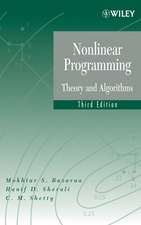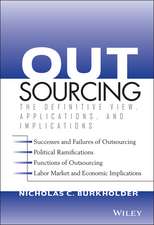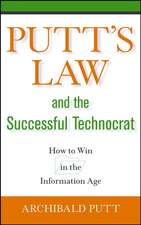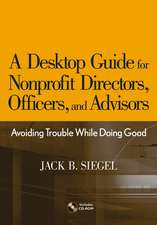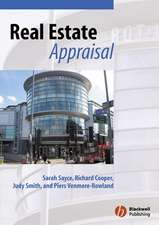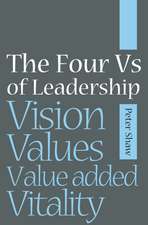Analysing Financial Statements for Non-Specialists
Autor Jim O'Hareen Limba Engleză Paperback – noi 2016
With updated examples to reflect the current business environment, including new material on the ethical considerations, and a wider array of business examples, from retail to services and banks, O’Hare continues to demist financial statements for non-specialists. In this new and refreshed edition, he once again covers the topic in an accessible way and assumes no prior training or study in accounting.
Offering a range of extra resources, including end of chapter questions, topics for further discussion and brimming with real-world examples, this concise new edition provides a comprehensive resource that will be welcomed by lecturers and instructors charged with delivering classes on financial statements.
| Toate formatele și edițiile | Preț | Express |
|---|---|---|
| Paperback (1) | 404.68 lei 6-8 săpt. | |
| Taylor & Francis – noi 2016 | 404.68 lei 6-8 săpt. | |
| Hardback (1) | 1103.66 lei 6-8 săpt. | |
| Taylor & Francis – 26 oct 2016 | 1103.66 lei 6-8 săpt. |
Preț: 404.68 lei
Nou
Puncte Express: 607
Preț estimativ în valută:
77.45€ • 80.01$ • 64.45£
77.45€ • 80.01$ • 64.45£
Carte tipărită la comandă
Livrare economică 25 martie-08 aprilie
Preluare comenzi: 021 569.72.76
Specificații
ISBN-13: 9781138641532
ISBN-10: 1138641537
Pagini: 146
Ilustrații: 70 Tables, black and white
Dimensiuni: 138 x 216 x 10 mm
Greutate: 0.18 kg
Ediția:2nd edition
Editura: Taylor & Francis
Colecția Routledge
Locul publicării:Oxford, United Kingdom
ISBN-10: 1138641537
Pagini: 146
Ilustrații: 70 Tables, black and white
Dimensiuni: 138 x 216 x 10 mm
Greutate: 0.18 kg
Ediția:2nd edition
Editura: Taylor & Francis
Colecția Routledge
Locul publicării:Oxford, United Kingdom
Public țintă
General and ProfessionalCuprins
1. Why is Analyzing Financial Statements Necessary?
2. What Information is provided in Company Financial Statements?
3. Analyzing Profitability
4. Analyzing Liquidity
5. Analyzing Financial Gearing
6. Analyzing Shareholder Interests
7. Predicting Corporate Failure
8. Using other Information in Company Annual Reports
9. Corporate Governance
10. Business Valuations
11. What do Financial Statements not tell the Users?
2. What Information is provided in Company Financial Statements?
3. Analyzing Profitability
4. Analyzing Liquidity
5. Analyzing Financial Gearing
6. Analyzing Shareholder Interests
7. Predicting Corporate Failure
8. Using other Information in Company Annual Reports
9. Corporate Governance
10. Business Valuations
11. What do Financial Statements not tell the Users?
Recenzii
'Analysing Financial Statements provides a clearly-written overview of the uses and interpretation of accounting information. It will be useful to novices seeking a basic understanding, but also those with a background in accounting who need a refresher.' - Douglas Lamdin, Professor of Economics, University of Maryland, Baltimore County, USA
'This book provides an excellent introduction to the analysis of financial statements. Its clear and concise focus on analysis and interpretation makes it an invaluable resource for non-specialists who need to know how to use financial statements to support decision making.' - Simon Finley, Associate Dean and Senior Teaching Fellow in Accounting, Aston University, UK
'A first-rate, compact introduction to company accounts and how to evaluate published financial statements. Delivered in manageable chapters, it guides non-financially sophisticated readers through practical techniques used to interpret information to give an insight into the performance and financial position of a company. Illustrative examples, activities and discussion topics make this book an ideal text for academic courses requiring no prior knowledge of accounting.' - Lynne Howey, Senior Lecturer in Economics and Accounting, University of Leicester, UK
'This is an excellent book for those who are interested in the analysis of financial statements. The book is concise but covers all important aspects of financial analysis.' - Radha Shiwakoti, Senior Lecturer in Accounting, Brunel University London, UK.
'This book provides an excellent introduction to the analysis of financial statements. Its clear and concise focus on analysis and interpretation makes it an invaluable resource for non-specialists who need to know how to use financial statements to support decision making.' - Simon Finley, Associate Dean and Senior Teaching Fellow in Accounting, Aston University, UK
'A first-rate, compact introduction to company accounts and how to evaluate published financial statements. Delivered in manageable chapters, it guides non-financially sophisticated readers through practical techniques used to interpret information to give an insight into the performance and financial position of a company. Illustrative examples, activities and discussion topics make this book an ideal text for academic courses requiring no prior knowledge of accounting.' - Lynne Howey, Senior Lecturer in Economics and Accounting, University of Leicester, UK
'This is an excellent book for those who are interested in the analysis of financial statements. The book is concise but covers all important aspects of financial analysis.' - Radha Shiwakoti, Senior Lecturer in Accounting, Brunel University London, UK.
Descriere
With updated examples to reflect the current business environment, including new material on the ethical considerations, and a wider array of business examples, from retail to services and banks, O’Hare continues to demist financial statements for non-specialists, covering the topic in an accessible way and assuming no prior training or study in accounting. Offering a range of extra resources, including end of chapter questions, topics for further discussion and brimming with real-world examples, this concise new edition provides a comprehensive resource that will be welcomed by lecturers and instructors charged with delivering classes on financial statements.

